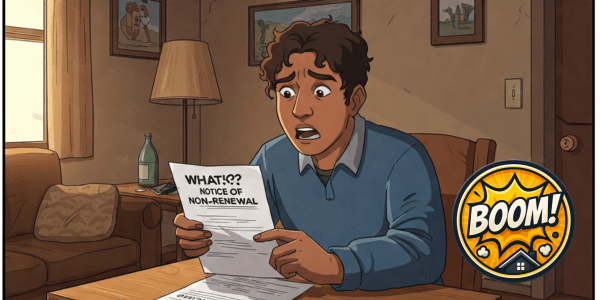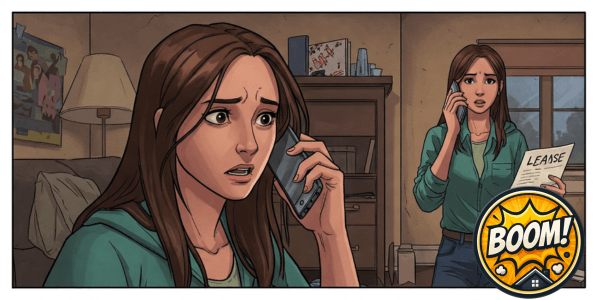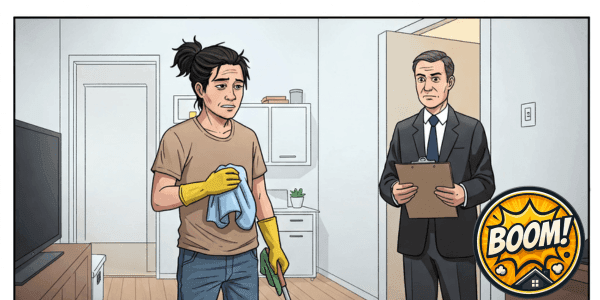Landlord Not Renewing Lease?

- Landlord Not Renewing Lease?
- What Happens When a Fixed-Term Lease Expires?
- The Critical Role of State and Local "Just Cause" Laws
- California's Statewide Protections: The Tenant Protection Act (AB 1482)
- Santa Barbara: Stronger Local Ordinances as an Example
- If You're Not in California (or Santa Barbara): How to Find Your Rights
- What to Do When You Receive a Non-Renewal Notice
- Conclusion
- FAQ – Landlord Not Renewing Lease & Tenant Rights
Receiving notice that your landlord doesn’t plan to renew your fixed-term lease can feel like an immediate eviction notice. However, the end of your lease term doesn’t always mean you automatically have to move out. Your tenant rights when a lease ends depend heavily on your location, varying significantly by state and even by city.
Understanding your specific local and state laws is absolutely crucial. This article will explain what typically happens when a fixed lease expires, highlight the critical role of “Just Cause Eviction” laws, use California and Santa Barbara as detailed examples of strong tenant protections, and provide clear steps on how to find the rules that protect you, no matter where you rent in the United States.
What Happens When a Fixed-Term Lease Expires?
A fixed-term lease has a defined start and end date. When that end date arrives, absent any specific clauses about automatic renewal (which are less common in many areas), the lease agreement itself concludes. At this point, several outcomes are possible:
- You move out on or before the lease end date, fulfilling the terms of the agreement.
- You and your landlord negotiate and sign a new fixed-term lease.
- You and your landlord agree to transition to a month-to-month tenancy.
- In many states (like California), if you continue living in the property and the landlord accepts rent after the lease expires, and neither party has given a proper notice to terminate, your tenancy automatically converts to a month-to-month arrangement under the original lease terms by default.
- The landlord provides you with a notice of non-renewal, indicating they want you to vacate the property by the lease end date.
The central question then becomes: Can a landlord always choose option #5 (non-renewal) without providing a specific reason? Or do you have legal rights that allow you to stay? This is where the specific laws governing landlord non-renewal and lease termination in your location come into play.
The Critical Role of State and Local “Just Cause” Laws
While the basic concept of a lease having an end date is universal, the degree of protection you have against your landlord choosing not to renew it without cause varies dramatically.
Many states and, more commonly, cities and counties have enacted “Just Cause Eviction” laws. These laws require landlords to have a specific, legally defined reason (a “just cause”) to terminate a tenancy, even when a fixed lease term is ending or during a month-to-month tenancy.
- In areas without Just Cause laws: A landlord can typically decide not to renew a fixed-term lease simply by giving you the legally required notice (which varies by location, often 30 or 60 days). They do not need to state a reason like lease violation or intent to move in.
- In areas with Just Cause laws: A landlord generally cannot refuse to renew a fixed-term lease or terminate a month-to-month tenancy unless they have one of the specific “just cause” reasons listed in the local or state law. These reasons often fall into categories like:
- At-Fault Just Cause: Tenant actions, such as failing to pay rent, violating material lease terms, causing significant damage, or engaging in illegal activity.
- No-Fault Just Cause: Reasons unrelated to the tenant’s behavior, such as the owner or a family member moving in, substantial remodeling requiring the tenant to vacate, or withdrawing the property from the rental market. (These often require the landlord to pay the tenant relocation assistance).
Understanding whether your property is covered by “Just Cause” protections is the single most important step in determining your rights when facing a non-renewal notice.
California’s Statewide Protections: The Tenant Protection Act (AB 1482)
California’s Tenant Protection Act of 2019 (AB 1482) provides significant statewide tenant protections for many renters. While AB 1482 doesn’t mandate that a landlord must offer a new fixed-term lease contract, it does severely limit their ability to terminate a tenancy without just cause once a tenant has lived in the property for 12 months or more (or 24 months if additional adults moved in later).
- Just Cause Requirement: If your property is covered by AB 1482, a landlord generally cannot issue a notice of non-renewal landlord CA at the end of your fixed term unless they have a valid “just cause” reason as defined by the Act. This prevents arbitrary non-renewals for covered properties.
- Notice Period: If a landlord does have a valid just cause and wants you to leave at the end of your fixed term (or during a month-to-month tenancy), they must typically provide a landlord notice to terminate lease CA, often 60 days if you’ve resided there for a year or more.
- Rent Caps: AB 1482 also includes provisions limiting annual rent increases (generally 5% plus the local Consumer Price Index, capped at 10% overall) and requires proper rent increase notice California.
Important Note: AB 1482 has specific exemptions. These include single-family homes and condominiums not owned by a corporation or REIT (Real Estate Investment Trust), properties built within the last 15 years, and some types of affordable housing, among others. Not all rental units in California are covered.

Santa Barbara: Stronger Local Ordinances as an Example
The City of Santa Barbara is a prime example of how local laws can layer stronger protections on top of state law. Santa Barbara has its own local ordinances concerning rent control and just cause eviction, which significantly impact Santa Barbara lease renewal laws:
- Stricter Just Cause: Santa Barbara’s local Just Cause Eviction Ordinance often provides stricter requirements and fewer exemptions than state law. This means a landlord in Santa Barbara generally cannot refuse to renew a fixed-term lease or terminate a month-to-month tenancy simply because the term is up or without cause, unless that cause is explicitly defined and proven under the Santa Barbara ordinance. Tenants in Santa Barbara often have a robust right to continued occupancy absent legally defined just cause.
- Relocation Assistance: Santa Barbara’s ordinance mandates substantial relocation assistance payments to tenants displaced by “no-fault” evictions (like owner move-in or substantial remodel).
- Local Rent Control: The city’s rent control ordinance has its own rules limiting annual rent increases, requiring specific rent increase notice Santa Barbara, and may provide stronger caps than the state formula.
Santa Barbara clearly demonstrates that checking local city or county ordinances is absolutely essential, as they can offer protections that go above and beyond statewide rules, fundamentally altering a landlord’s ability to end a tenancy upon lease expiration.
If You’re Not in California (or Santa Barbara): How to Find Your Rights
The single most important takeaway is that landlord-tenant laws state by state and city by city. The rules governing lease termination and landlord non-renewal where you live may be completely different from California, New York, Texas, Illinois, Florida, or anywhere else.
Here’s how to find the laws that apply specifically to you:
- Research Your State’s Landlord-Tenant Laws: Start with your state. Search online for “[Your State] landlord tenant laws,” “[Your State] lease termination notice requirements,” “[Your State] fixed lease end,” or “[Your State] just cause eviction law.” Look for official government websites (like your state’s Attorney General or Department of Housing) or reputable legal aid resources.
- Crucially, Check Your Local City or County Ordinances: This step is often overlooked but is vital. Many cities and counties have local ordinances that provide additional protections, especially concerning rent control and just cause for eviction. Search for “[Your City/County] rent control ordinance,” “[Your City/County] just cause eviction,” or “[Your City/County] housing code.” Check your city or county’s official website, often under sections like “Municipal Code,” “Housing Department,” or “City Attorney.”
- Consult Local Resources: Tenant laws can be complex. Local Legal Aid societies, tenant advocacy non-profits, or attorneys specializing in landlord-tenant law are excellent resources. They can provide advice specific to your situation and location. You can also look for resources on how to file a complaint against a landlord in your area if you believe your rights are being violated.
What to Do When You Receive a Non-Renewal Notice
Regardless of where you live, receiving a landlord notice of non-renewal requires prompt action:
- Review the Notice Carefully: Check the date it was issued, the stated termination date, and verify it complies with the notice period required by your state and local laws.
- Determine if Just Cause Protection Applies: Immediately research your specific state and local laws (using the steps above). Does your state or city have “Just Cause” eviction rules? Does your property type (e.g., single-family home, apartment, age of building) fall under these protections? If so, the landlord likely needs a legally valid reason to terminate your tenancy, even if the lease term is ending.
- Review Your Lease Agreement: While state/local laws can override lease clauses, check for any language about lease end, notice requirements, or automatic renewal.
- Communicate (Carefully): If you’re unsure why the landlord isn’t renewing, or if you believe they might be mistaken about your intent, consider communicating with them in writing. However, be mindful not to waive any rights inadvertently.
- Seek Expert Help: If you determine that Just Cause laws apply to you and the landlord has not provided a valid reason, or if you suspect the non-renewal is illegal (e.g., retaliatory landlord won’t make repairs issues leading to the notice), contact a local tenant advocacy group or legal counsel specializing in landlord-tenant law in your area immediately. An illegal non-renewal might be grounds to challenge the notice, potentially allowing you to stay or seek damages.
Conclusion
A landlord’s decision not to renew a fixed-term lease is not always the final word on your tenancy. While leases have an end date, tenant protections, particularly “Just Cause Eviction” laws, vary dramatically by location and can prevent a landlord from ending your tenancy without a valid, legal reason.
California’s AB 1482 offers statewide just cause protection for many, and cities like Santa Barbara demonstrate how local ordinances can provide even stronger safeguards. Knowing your rights regarding lease non-renewal absolutely requires you to understand the specific landlord-tenant laws and tenant protections in your state and, crucially, your city or county. Don’t assume you have to move just because the lease term is ending – research your local laws to understand your full rights and options.
FAQ – Landlord Not Renewing Lease & Tenant Rights
Does a landlord always need a specific reason to not renew a fixed-term lease?
No, not in all places. In areas without “Just Cause” eviction laws, landlords can typically choose not to renew a lease by giving proper notice, without needing a specific reason like a lease violation. However, in states (like California for many properties) and many cities with “Just Cause” laws, a landlord must have one of the legally defined reasons to terminate a tenancy after a tenant has lived there for a certain period, even when a fixed lease expires.
What happens in California if my fixed lease expires and I don’t sign a new one?
In California, if your fixed-term lease expires and you continue living in the property with the landlord’s permission (by them accepting rent, for example) and neither party has served a notice to terminate, your tenancy automatically converts by default to a month-to-month agreement under the same terms and conditions as the expired lease.
How does California’s AB 1482 affect a landlord’s decision not to renew a lease?
For many properties covered by AB 1482, landlords in California generally must have “just cause” (a valid reason listed in the law) to terminate a tenancy after a tenant has lived there for 12 months or more. This means they cannot typically issue a non-renewal notice without a legally recognized reason at the end of a fixed term if the property is covered and the tenant meets the residency requirement.
Are there enhanced protections against lease non-renewal in Santa Barbara, CA?
Yes. The City of Santa Barbara has local ordinances that protect Tenant rights when lease ends, including a Just Cause Eviction ordinance, that often provide stronger protections than statewide law. Landlords in Santa Barbara must adhere to specific, often stricter, “just cause” reasons defined by the city to terminate a tenancy or refuse to renew a lease. They may also be required to pay significant relocation assistance for “no-fault” evictions
How much notice must a landlord give if they are not renewing my lease?
The required notice period for lease non-renewal varies significantly by state and local law. It is commonly 30 or 60 days, but it can depend on how long you’ve been a tenant, the type of tenancy (fixed vs. month-to-month), and whether your property is subject to state or local just cause or notice period regulations. You must check the specific laws for your location
What should I do immediately if I receive a non-renewal notice?
Review the notice and your lease. 2) Immediately research your specific state and local landlord-tenant laws to see if “just cause” eviction protections apply to your property and what notice period is required. 3) If you believe the notice is illegal or violates your rights based on your research, seek assistance from a local tenant advocacy group or legal aid immediately. Do not assume you have to move out without verifying your rights.
Other Articles by Louis Oconnor
Completing Your Move-In Condition Report | Free Guide
Move-Out Inspection: What Your Landlord Is Really Looking For | Free Guide


